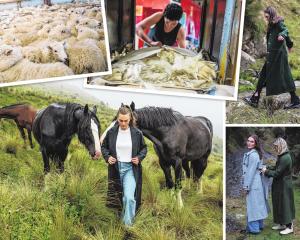
And the slightly unorthodox recipe is clearly working, as the company won a gold medal for The Bay Gin at the recent London Spirits Competition and picked up silver medals with its Dunedin Dry Gin and Naked Spirit.
In the ever-burgeoning gin category, company founders Jenny McDonald and Sue Stockwell’s point of difference is their spirits are produced using waste bread and bakery products — everything from lamingtons to raspberry buns and even the occasional cheese roll.
A new 500-litre still, known as Hildegard, has been commissioned this month — a nod to Hildegard of Bingen, a 12th century nun and botanist who was canonised as a saint in 2010 and whom Ms McDonald described as "a strong lady" — in a former scrapmetal dealer’s shed behind their shop in Roberts St.
That means the pair can not only increase production of their spirits, but also work towards tripling the quantity of bread and bakery waste they divert from landfill.
"This is just like a dream, what we could do in two weeks, we can do in one day," Mrs Stockwell said of the new addition.
Since launching Dunedin Craft Distillers, they have saved more than six tonnes of bread products from going to landfill and they hope to now achieve 18 tonnes annually.
The two women — whose only previous knowledge of alcohol was drinking it — established New Zealand’s first distillery that produces gin and vodka from waste bread and bakery products.
Asked why they thought they were the only ones to do it, Mrs Stockwell said it was because it was "hard".
Mrs Stockwell had a 45-year career in nutrition and food service management, while Ms McDonald’s background was in health science, IT and tertiary education.

They moved into the Harbour Basin premises in May 2021, which was when they got serious about their foray. Prior to that, they had shared a space at Artisan Pantry before deciding they could probably make a business out of the venture.
They were very determined about what their focus would be, acknowledging that bread waste was such a huge issue, even after the likes of food rescue organisation KiwiHarvest had redistributed excess quantities.
"We just said ‘it’s bonkers’," Ms McDonald said.
University of Otago research showed just under 3000 tonnes of bakery goods from commercial waste — including, on a per capita basis, about 80 tonnes from Dunedin — ended up in landfills each year.
It seemed ridiculous New Zealand imported all its sugar and "pristine" resources were used to make alcohol, while products containing sugar were being dumped.
Locally-sourced fermented honey, which would otherwise go to waste, was used to even out the sugar, while the buckets of solids at the end of the process went to local cows.
Their distilling journey had had its "ups and downs"; the biggest challenges being how to produce spirits from a bread source, and then scaling up and importing the still, Mrs Stockwell said.
Prior to the new still, they could not cope with the demand and were working themselves "to the bone".
They tried to get something local, but that proved too expensive, Ms McDonald said.
Hildegard arrived from China in November and it was commissioned this month.
"That was the wonderful thing — the first time we ran it, it did what it was meant to do," Mrs Stockwell said.
Another difference was the pair made their alcohol from scratch, whereas many craft distillers bought alcohol and then flavoured it, Ms McDonald said.
It was their first time entering in the London awards and Ms McDonald admitted they had to "sit down" when they were notified of their success.
The Bay Gin — flavoured with bay leaves from Mrs Stockwell’s garden — was the second gin they made, while the Dunedin Dry was their first.
Naked Spirit was their base alcohol and, while not exactly a whisky and not exactly a vodka, it was still "a very drinkable drink", Ms McDonald said.
The pair had proven they were not hobbyists, and they wanted to increase production so they were making enough money to pay themselves a reasonable wage and employ at least one person full-time.

They wanted to create a sustainable business that would become a brand in Dunedin, and also a destination to visit.
They were located on a "fantastic" site, next to the Ocho chocolate factory — and they used some of Ocho’s cacao nibs in their vodka, Ms McDonald said.
They were grateful to those who had supported them, including Artisan Pantry at the beginning, their landlord and also brewing king Richard Emmerson, who had been "brilliant" for sharing his knowledge.
A Soda grant allowed the pair to get Mr Emmerson on board with formal mentoring and, while that had now finished, he was still in contact with them.
There was a wide range of food waste products and a "whole range of opportunities" for the business.
"In some ways, the sky’s the limit," Ms McDonald said.
One annoying factor was the lack of a soft plastic recycling facility in Dunedin, when bread was wrapped in soft plastics.
If local people were able to deal with local waste, then Dunedin "might actually get on top of some of these things", Ms McDonald said.












